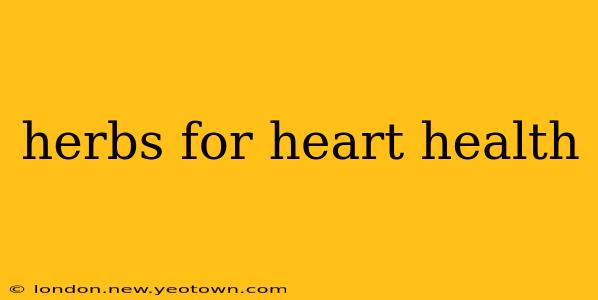For centuries, humans have looked to nature for remedies, and when it comes to heart health, the plant kingdom offers a treasure trove of potential allies. While herbs shouldn't replace prescribed medications, many offer supportive benefits that can contribute to a healthier heart. This isn't about a quick fix; it's about a journey towards better heart health, incorporating the wisdom of traditional practices with modern scientific understanding.
What Herbs are Good for the Heart?
This is a question many ask, and the answer isn't a simple list. The effectiveness of any herb depends on various factors, including individual health, dosage, and the quality of the herb itself. Let's explore some of the prominent contenders:
Hawthorn Berry (Crataegus monogyna): A Timeless Tonic
Imagine a crisp autumn day, walking through a hedgerow laden with bright red hawthorn berries. This unassuming fruit has been used for centuries to support heart health. Modern research suggests hawthorn may help improve blood flow, lower blood pressure, and even alleviate some symptoms of heart failure. It's often seen as a gentle, supportive herb, working alongside other strategies for heart health.
Garlic (Allium sativum): The pungent protector
The strong aroma of garlic is a testament to its potent properties. Beyond its culinary uses, garlic has a long history of use in traditional medicine, particularly for cardiovascular health. Studies suggest that compounds in garlic can help lower cholesterol and blood pressure, contributing to a reduced risk of heart disease. However, remember that the active compounds are sensitive to heat, so consuming raw garlic might be more beneficial.
Hibiscus (Hibiscus sabdariffa): A vibrant bloom for blood pressure
The vibrant red flowers of the hibiscus plant are not just visually stunning; they are also packed with antioxidants and beneficial compounds. Research suggests that hibiscus tea might help lower blood pressure. Its tart flavor makes it a refreshing and potentially heart-healthy beverage.
Can Herbs Cure Heart Disease?
This is a crucial point to understand. Herbs are not a cure for heart disease. They can be valuable supplementary tools in a comprehensive heart-healthy lifestyle, but they should never replace prescribed medications or medical advice from a healthcare professional. If you have heart disease, consult your doctor before using any herbal remedies.
What are the Side Effects of Herbs for Heart Health?
Like any substance, herbs can have side effects. Some people might experience mild digestive upset, allergies, or interactions with other medications. It's always wise to start with a low dose and monitor your body's response. Always consult your doctor or a qualified herbalist before using herbs, especially if you are pregnant, breastfeeding, or taking other medications.
How Do I Choose High-Quality Herbal Supplements?
Choosing high-quality herbal supplements is vital. Look for reputable brands that provide third-party testing to ensure purity and potency. Avoid products with fillers or unnecessary additives.
Are There Any Interactions Between Herbs and Medications?
Yes, there can be interactions between herbs and medications. Some herbs might affect how your body processes certain drugs, leading to either reduced effectiveness or increased side effects. Always inform your doctor about all the supplements you are taking, including herbs, to avoid potentially dangerous interactions.
What is the Best Way to Incorporate Herbs into My Heart-Healthy Lifestyle?
Incorporating herbs into your lifestyle should be a gradual process. Start by adding one or two herbs into your diet, whether through tea, culinary use, or supplements. Focus on a holistic approach that includes regular exercise, a balanced diet, stress management, and regular check-ups with your doctor. Remember, a healthy heart is a journey, not a destination, and nature's pharmacy can play a supportive role along the way.
Disclaimer: This information is for educational purposes only and is not intended as medical advice. Always consult with a healthcare professional before starting any new herbal remedies or making changes to your existing healthcare plan.

